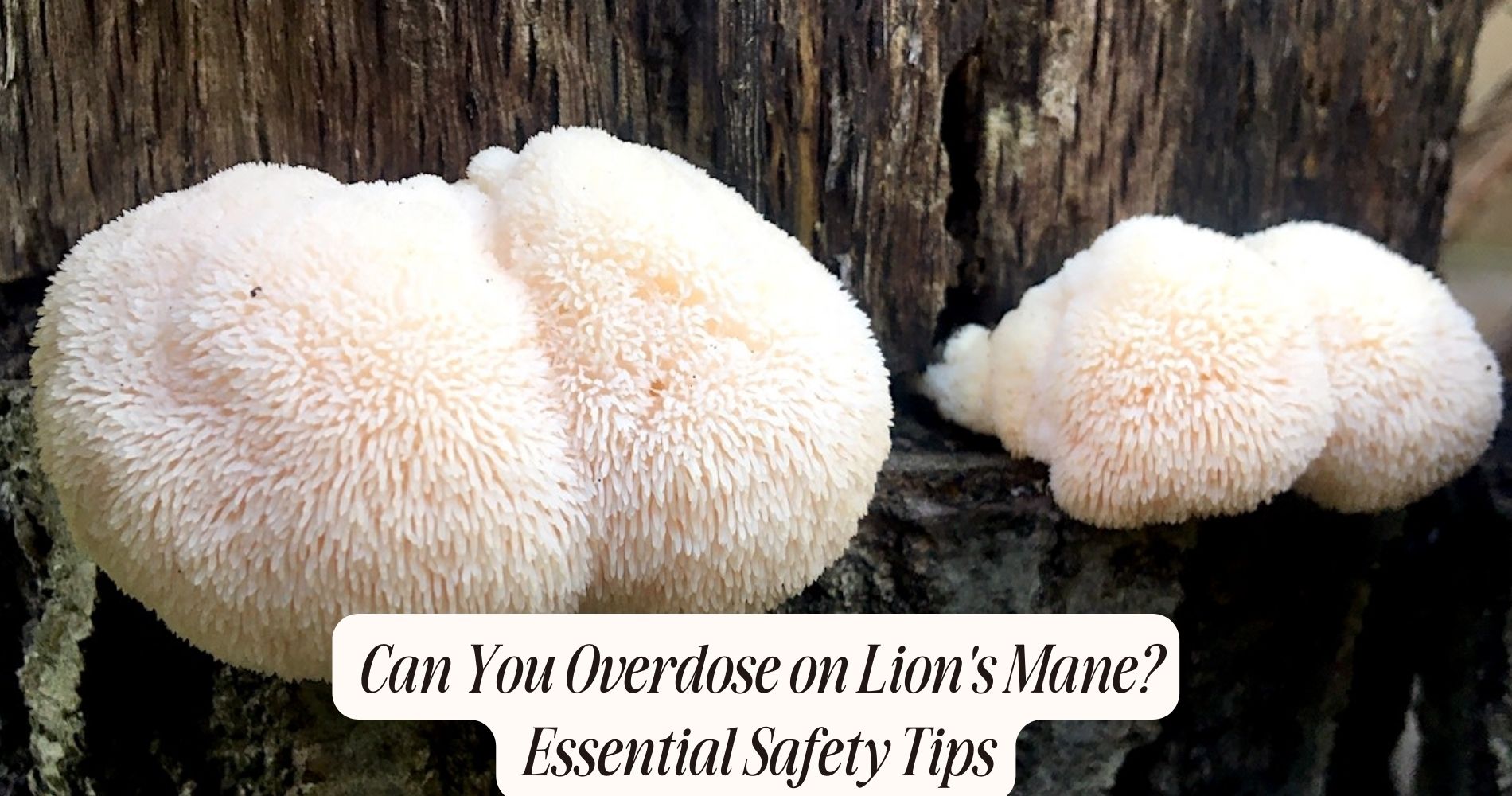
Can You Overdose on Lion's Mane? Essential Safety Tips
Can you overdose on lion's mane? Yes, you can overdose on lion's mane, though it's uncommon. Stick to the recommended daily dose of 500-3000 mg. Overconsumption can cause digestive issues like nausea, bloating, and diarrhea. Severe overdose symptoms may include gastrointestinal distress, dizziness, and difficulty breathing. Always start with a lower dose and increase gradually. Consulting with a healthcare professional before beginning supplementation is essential, especially if you have underlying health conditions or take other medications. For more insights into safe use and maximizing benefits, there's much more to discover.
Understanding Lion's Mane
Lion's Mane (Hericium erinaceus) is a medicinal mushroom known for its potential neuroprotective and cognitive-enhancing properties. You're likely interested in its health benefits, which include promoting nerve growth factor (NGF) synthesis, potentially aiding in the repair and regeneration of nerve cells. Studies suggest that Lion's Mane may improve cognitive function, particularly in individuals with mild cognitive impairment. Its anti-inflammatory and antioxidant properties further contribute to its reputation as a neuroprotective agent.

In addition to its health benefits, Lion's Mane has notable culinary uses. You can find it in various forms, including fresh, dried, or powdered. When cooked, it has a texture and flavor often compared to seafood, making it a versatile ingredient in soups, stir-fries, and even as a meat substitute. The mushroom's ability to absorb flavors from other ingredients enhances its culinary appeal.
Understanding Lion's Mane involves recognizing its dual role in promoting health and serving as a culinary delight. Its neuroprotective properties and culinary versatility make it an increasingly popular choice for those seeking both nutritional and therapeutic benefits.
Safe Dosage Guidelines
To fully leverage the benefits of Lion's Mane, it's essential to understand the recommended safe dosage guidelines. Historically, Lion's Mane has been used in traditional medicine and culinary applications across various cultures. Research suggests a daily intake of 500-3000 mg of Lion's Mane extract is generally safe for adults. This range is based on both historical usage and contemporary clinical studies.
When incorporating Lion's Mane into your diet, whether through supplements or culinary applications, it's important to start with a lower dose and gradually increase it. This approach allows your body to acclimate and helps monitor any adverse reactions. For culinary applications, consuming Lion's Mane mushrooms in their natural form, such as in soups or sautés, typically involves lower doses compared to concentrated extracts.
Clinical trials have demonstrated that doses within the 500-3000 mg range effectively promote cognitive function and neural health. However, individual responses can vary. Always consult a healthcare professional before beginning any new supplement regimen, especially if you have underlying health conditions or are taking other medications.
Potential Side Effects
While generally considered safe, consuming Lion's Mane can sometimes lead to side effects such as digestive discomfort or allergic reactions. You might experience gastrointestinal issues like nausea, bloating, or diarrhea. These symptoms are typically mild and resolve once you stop taking the supplement.
Allergic reactions, though less common, can occur. Symptoms may include skin rashes, itching, or swelling. If you notice any of these signs, it's important to discontinue use immediately and consult a healthcare professional. Individuals with known allergies to mushrooms should exercise caution, as Lion's Mane is a type of fungi.
Clinical studies have shown that these side effects usually manifest at higher doses. However, even at recommended dosages, sensitive individuals might experience discomfort. It's crucial to start with a lower dose and gradually increase it, monitoring your body's response. This approach minimizes the risk of adverse effects.
Additionally, interactions with other medications haven't been extensively studied, so you should consult your doctor if you're on other treatments.
Signs of Overdose
Excessive consumption of Lion's Mane may lead to symptoms such as severe gastrointestinal distress, dizziness, and difficulty breathing. These toxicity symptoms indicate that your body is reacting adversely to the mushroom.
Gastrointestinal distress can manifest as nausea, vomiting, or diarrhea. Dizziness may impair your balance and coordination, while difficulty breathing suggests a more severe reaction that requires immediate attention.

If you experience any of these symptoms after consuming Lion's Mane, it's important to assess the severity of your condition. Mild symptoms might resolve on their own, but persistent or worsening signs warrant professional medical evaluation. Monitoring your symptoms closely will help determine the need for an emergency response.
In cases of severe toxicity, you should seek emergency medical assistance immediately. Difficulty breathing is particularly alarming and necessitates prompt care to prevent complications. When contacting emergency services, provide detailed information about your Lion's Mane consumption and any other symptoms you're experiencing. This information is essential for healthcare providers to administer the appropriate treatment.
Interactions With Medications
When taking Lion's Mane, it's important to take into account potential interactions with medications. Historically used in traditional medicine and culinary applications, Lion's Mane has gained popularity for its potential cognitive and neuroprotective benefits. However, its interaction with certain medications shouldn't be overlooked.
Lion's Mane may enhance the efficacy of anticoagulants and antiplatelet drugs. This could increase bleeding risks, especially if you're already on medications like warfarin or aspirin.
Additionally, its potential to lower blood sugar levels means you should exercise caution if you're taking antidiabetic medications, as it could potentiate hypoglycemic effects.
The mushroom also exhibits immunomodulatory properties, which may influence the effectiveness of immunosuppressants. If you're on drugs like cyclosporine, it's advisable to consult your healthcare provider before incorporating Lion's Mane into your regimen.
Given its broad range of bioactive compounds, Lion's Mane could interact with other medications in unpredictable ways. Discussing its use with a healthcare professional helps you mitigate risks while enjoying its benefits.
Always consider both its historical uses and culinary applications, but prioritize safety, especially when medications are involved. This ensures a balanced approach to incorporating Lion's Mane into your health routine.
Best Practices for Use
To guarantee safety and efficacy, you should adhere to recommended dosage guidelines for Lion's Mane, typically ranging from 500 to 3000 mg per day.
It's important to time your doses consistently, ideally with meals to enhance absorption and minimize gastrointestinal discomfort.
Monitoring frequency and duration of use can help mitigate any potential risks associated with long-term consumption.
Recommended Dosage Guidelines
Following the recommended dosage guidelines for Lion's Mane is essential to maximize its benefits while minimizing potential risks. When considering dosage, it's important to factor in the cultivation methods and culinary applications of Lion's Mane. Organically cultivated mushrooms tend to have higher concentrations of beneficial compounds. Hence, you should seek products from reputable sources that emphasize organic farming practices.

For general cognitive enhancement, a common dosage ranges from 500 mg to 3 grams per day, depending on the form—whether it's a supplement, powder, or whole mushroom. If you're incorporating Lion's Mane into culinary applications, such as soups or teas, consider that the bioavailability of its compounds might vary. Cooking methods can impact the efficacy, so it's advisable to follow preparation guidelines that preserve its active ingredients.
Clinical studies suggest starting with a lower dose, around 500 mg per day, to assess individual tolerance. Gradually increasing the dosage can help mitigate any adverse effects. Always consult with a healthcare provider before beginning any new supplement regimen, especially if you have pre-existing medical conditions or are taking other medications.
Timing and Frequency
Considering the importance of suitable dosage, it's equally vital to understand the best timing and frequency for consuming Lion's Mane to maximize its benefits. Research indicates that incorporating Lion's Mane into your daily routine can enhance cognitive function and support overall well-being. For best results, take Lion's Mane in the morning or early afternoon. This timing aligns with the body's natural rhythms and can help sustain energy levels throughout the day.
In terms of frequency, daily consumption is recommended for consistent benefits. Studies have shown that regular intake contributes to neuroprotection and cognitive enhancement. However, it's crucial to monitor your body's responses and adjust accordingly. Begin with a lower dose, gradually increasing as needed, to find what works best for you.
Lifestyle integration is key to maximizing the benefits of Lion's Mane. Pairing it with a balanced diet, regular exercise, and adequate sleep can amplify its positive effects. Additionally, ensure high-quality mushroom sourcing to avoid contaminants and ensure potency. Look for reputable suppliers who provide third-party testing results.
Consulting a Healthcare Professional
Consulting with a healthcare professional guarantees that you receive personalized and evidence-based guidance on the safe usage of Lion's Mane. A medical consultation ensures that any advice you receive is tailored to your specific health needs and medical history. Healthcare professionals can offer professional advice based on the latest research and clinical guidelines, which helps mitigate potential risks and side effects.
During a medical consultation, your healthcare provider can assess whether Lion's Mane is appropriate for you, considering factors such as current medications, pre-existing conditions, and overall health status. They can also recommend the appropriate dosage and form, whether it's a supplement, extract, or raw mushroom. This individualized approach minimizes the risk of adverse reactions and ensures optimal benefits.

Moreover, healthcare professionals can monitor your progress and make necessary adjustments to your regimen. Regular follow-ups provide an opportunity to discuss any side effects and make evidence-based adjustments. This ongoing professional advice is crucial, especially if you're combining Lion's Mane with other treatments or supplements.
Ultimately, consulting a healthcare professional is an essential step for anyone considering Lion's Mane to ensure safety, efficacy, and a personalized approach to wellness.
Frequently Asked Questions
Can Lion's Mane Be Used in Cooking Recipes?
Yes, you can use Lion's Mane in cooking recipes. Its culinary versatility and unique flavor profile make it a valuable addition to various dishes, including soups, stir-fries, and teas. Experiment for best taste and texture.
Is Lion's Mane Safe for Children and Pets?
When considering Lion's Mane for children and pets, always follow dosage guidelines. Pediatric considerations require consulting a healthcare professional to guarantee safe use. It's essential to monitor for any adverse reactions and adjust dosages accordingly.
How Should Lion's Mane Be Stored to Maintain Potency?
You should store Lion's Mane in a cool, dark place to maintain its potency. Best storage temperature is below 20°C, and it should be protected from light exposure to prevent degradation of active compounds.
Are There Any Known Allergic Reactions to Lion's Mane?
Yes, there are known allergic reactions to Lion's Mane. Allergic symptoms include skin rashes and respiratory issues. It's advisable to perform sensitivity tests before consumption to make certain you don't experience adverse reactions.
Does Lion's Mane Have Any Environmental Sustainability Concerns?
You need to prioritize environmental sustainability when evaluating Lion's Mane. Effective cultivation practices can mitigate habitat destruction. Prioritize habitat preservation to guarantee long-term viability and minimize ecological impact. Research supports sustainable methods for mushroom production.
Conclusion
To sum up, while lion's mane can offer various health benefits, it's important to follow safe dosage guidelines to avoid potential side effects and interactions with medications. Signs of overdose may include gastrointestinal distress or allergic reactions.
Always consult a healthcare professional before starting any new supplement regimen. By adhering to best practices and professional advice, you can safely incorporate lion's mane into your wellness routine without undue risk.



